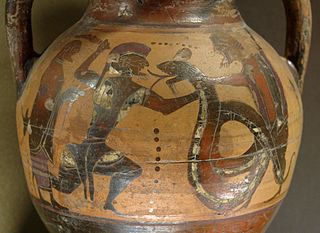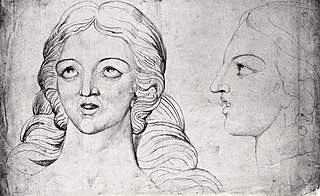
In Greek mythology, Cerberus, often called the "hound of Hades", is a multi-headed dog that guards the gates of the Underworld to prevent the dead from leaving. Cerberus was the offspring of the monsters Echidna and Typhon, and usually is described as having three heads, a serpent for a tail, and snakes protruding from parts of his body. Cerberus is primarily known for his capture by Heracles, one of Heracles' twelve labours.

Hesiod was a Greek poet generally thought by scholars to have been active between 750 and 650 BC, around the same time as Homer. He is generally regarded as the first written poet in the Western tradition to regard himself as an individual persona with an active role to play in his subject. Ancient authors credited Hesiod and Homer with establishing Greek religious customs. Modern scholars refer to him as a major source on Greek mythology, farming techniques, early economic thought, archaic Greek astronomy and ancient time-keeping.
Latin literature includes the essays, histories, poems, plays, and other writings written in the Latin language. The beginning of Latin literature dates to 240 BC, when the first stage play was performed in Rome. Latin literature would flourish for the next six centuries. The classical era of Latin literature can be roughly divided into the following periods: Early Latin literature, The Golden Age, The Imperial Period and Late Antiquity.

Theseus was the mythical king and founder-hero of Athens. Like Perseus, Cadmus, or Heracles, Theseus battled and overcame foes that were identified with an archaic religious and social order: “This was a major cultural transition, like the making of the new Olympia by Hercules”.

In Greek mythology, Helen of Troy, also known as Helen of Sparta, was said to have been the most beautiful woman in the world. She was married to King Menelaus of Sparta but was abducted by Prince Paris of Troy after the goddess Aphrodite promised her to him in the Judgement of Paris. This resulted in the Trojan War when the Achaeans set out to reclaim her. She was believed to have been the daughter of Zeus and Leda, and was the sister of Clytemnestra, Castor, Polydeuces, Philonoe, Phoebe and Timandra.

In Greek mythology, Pirithous was the King of the Lapiths of Larissa in Thessaly.
The Lapiths are a legendary people of Greek mythology, whose home was in Thessaly, in the valley of the Peneus and on the mountain Pelion.
Isthmian Games or Isthmia were one of the Panhellenic Games of Ancient Greece, and were named after the Isthmus of Corinth, where they were held. As with the Nemean Games, the Isthmian Games were held both the year before and the year after the Olympic Games, while the Pythian Games were held in the third year of the Olympiad cycle.

Corinna or Korinna was an ancient Greek lyric poet from Tanagra in Boeotia, who has been called the most famous ancient Greek woman poet after Sappho. Although ancient testimonia portray her as a contemporary of Pindar, not all modern scholars accept the accuracy of this tradition, and some claim that she is more likely to have lived in the Hellenistic period of 323 to 31 BCE. Her works, which survive only in fragments, focus on local Boeotian legends. Though her poetry is of interest as the work of one of the few preserved female poets from ancient Greece, modern critics generally rate it poorly.
The Naupactia is a lost epic poem of ancient Greek literature. In antiquity the title was also written Naupaktika, and it is also in the present day sometimes referred to among scholars by the Latin phrase carmen Naupactium. Naupactus is a city in Greece on the Corinthian Gulf.
The Telegony is a lost ancient Greek epic poem about Telegonus, son of Odysseus by Circe. His name is indicative of his birth on Aeaea, far from Odysseus' home of Ithaca. It was part of the Epic Cycle of poems that recounted the myths of the Trojan War as well as the events that led up to and followed it. The story of the Telegony comes chronologically after that of the Odyssey and is the final episode in the Epic Cycle. The poem was sometimes attributed in antiquity to Cinaethon of Sparta, but in one source it is said to have been stolen from Musaeus by Eugamon or Eugammon of Cyrene. The poem comprised two books of verse in dactylic hexameter.
The Cypria is a lost epic poem of ancient Greek literature, which has been attributed to Stasinus and was quite well known in classical antiquity and fixed in a received text, but which subsequently was lost to view. It was part of the Epic Cycle, which told the entire history of the Trojan War in epic hexameter verse. The story of the Cypria comes chronologically at the beginning of the Epic Cycle, and is followed by that of the Iliad; the composition of the two was apparently in the reverse order. The poem comprised eleven books of verse in epic dactylic hexameters.
Cyclic Poets is a shorthand term for the early Greek epic poets, approximate contemporaries of Homer. We know no more about these poets than we know about Homer, but modern scholars regard them as having composed orally, as did Homer. In the classical period, surviving early epic poems were ascribed to these authors, just as the Iliad and Odyssey were ascribed to Homer. Together with Homer, whose Iliad covers a mere 50 days of the war, they cover the complete war "cycle", thus the name. Most modern scholars place Homer in the 8th century BC. The other poets listed below seemed to have lived in the 7th–5th centuries BC. Excluding Homer's, none of the works of the cyclic poets survive.
Eumelus of Corinth, of the clan of the Bacchiadae, is a semi-legendary early Greek poet to whom were attributed several epic poems as well as a celebrated prosodion, the treasured processional anthem of Messenian independence that was performed on Delos. One small fragment of it survives in a quote by Pausanias. To Eumelus was also attributed authorship of several antiquarian epics composed in the Corinthian-Sicyonian cultural sphere, notably Corinthiaca, an epic narrating the legends and early history of his home city Corinth. The Corinthiaca is now lost, but a written version of it was used by Pausanias in his survey of the antiquities of Corinth.
Epigoni was an early Greek epic, a sequel to the Thebaid and therefore grouped in the Theban cycle. Some ancient authors seem to have considered it a part of the Thebaid and not a separate poem.
The Thebaid or Thebais is an Ancient Greek epic poem of uncertain authorship sometimes attributed by early writers to Homer. It told the story of the war between the brothers Eteocles and Polynices, and was regarded as forming part of a Theban Cycle. Only fragments of the text survive.

In Greek mythology, Hippodamia.

The Temple of Ares was a sanctuary dedicated to Ares, located in the northern part of the Ancient Agora of Athens. The Temple was identified as such by Pausanias but the ruins present today indicate a complex history. Ares had a temple somewhat like Athena's.
The Oedipodea is a lost poem of the Theban cycle, a part of the Epic Cycle. The poem was about 6,600 verses long and the authorship was credited by ancient authorities to Cinaethon (Κιναίθων), a barely known poet who lived probably in Sparta. Eusebius says that he flourished in 764/3 BC. Only three short fragments and one testimonium survived.
The Descent of Perithous is a fragmentary epic poem that was ascribed to Hesiod by the 2nd-century CE geographer Pausanias. The eponymous topic of the poem would have been the myth of Theseus and Perithous' trip to Hades seeking to win Persephone as bride for Perithous. During the expedition, Hades trapped the heroes by seating them in the "chairs of forgetfullness", and only Heracles could save them. One tentatively assigned papyrus fragment survives which includes a conversation between Meleager and Theseus. It is also possible that this fragment belongs to the Minyas, and the existence of an independent Hesiodic poem on the descent of Theseus and Perithous is complicated by the fact that elsewhere Pausanias attributes the myth to the Minyas. The sheer number of Hesiodic papyri that have survived compared to those of other works of archaic epic, however, lends credence to the attribution to the Hesiodic corpus.










